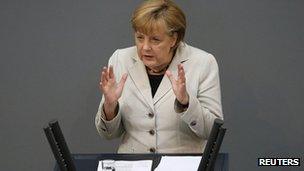Merkel relief at 'good day for Europe'
- Published
- comments

Chancellor Angela Merkel, speaking at the Bundestag, welcomed the ruling
Chancellor Merkel stood before the ranks of the Bundestag yesterday and declared it "a good day for Europe".
The German Constitutional Court had just given the green light for the ESM - the eurozone's permanent bailout fund - to go ahead.
So it was possible to deploy yet another weapon in fighting the eurozone crisis. The ESM - with a 500bn-euro (£400bn) war chest - will handle future bailouts.
So several obstacles that might have spooked the markets have been cleared from the path. Some European officials - who last year declared the crisis over - are hopeful once again.
It helped that the Dutch electorate, at the last moment, shied away from backing parties openly critical of the centralising power of Brussels.
The days of unbending austerity are over in Europe. Officials and leaders are operating on flexi-time.
The ECB was given the nod from Berlin to agree to buy unlimited bonds of those countries in trouble.
Portugal, unable to meet its targets, has been given more time.
If Spain applies for a full bailout there are powerful voices saying no new conditions will be necessary. The promise that help comes with "strict conditionality" may not be kept.
Greece is certainly being told it must live up to its commitments, but talk of a Greek exit from the eurozone has suddenly disappeared from political circles in Berlin. Chancellor Merkel will not sanction it.
More Europe?
Suddenly there is the glimpse of a looser monetary policy, of targets relaxed and of debt being mutualised.
Ironically the key to this is national politics. There is now just over a year until elections in Germany. Chancellor Merkel does not want the eurozone crisis to dominate the campaign. That may be wishful thinking but compromise is the word of the moment.
The eurozone crisis - as widely predicted - is being used to justify deeper integration. President Barroso is calling for "a federation of nation states". Mrs Merkel is signed up for "more Europe".
The danger in this is that Europe will turn inward, obsessed by its own structures, unleashing intense debate about the Europe of the future. President Barroso hints at treaty change by 2014.
Selling more Europe will be a difficult task when the polls suggest increasing alienation from the European project.
In the meantime there is the real economy. There are over 24m people out of work. Recession, in some countries, is deepening. Debt is still climbing, growth elusive.
In some countries, like Greece, Spain and Italy consensus is fragile. There are some green shoots: exports to countries outside Europe are increasing and some competitiveness is returning.
So "A Good Day For Europe" - perhaps. But not yet for the real economy. And that is where Europe will be judged.